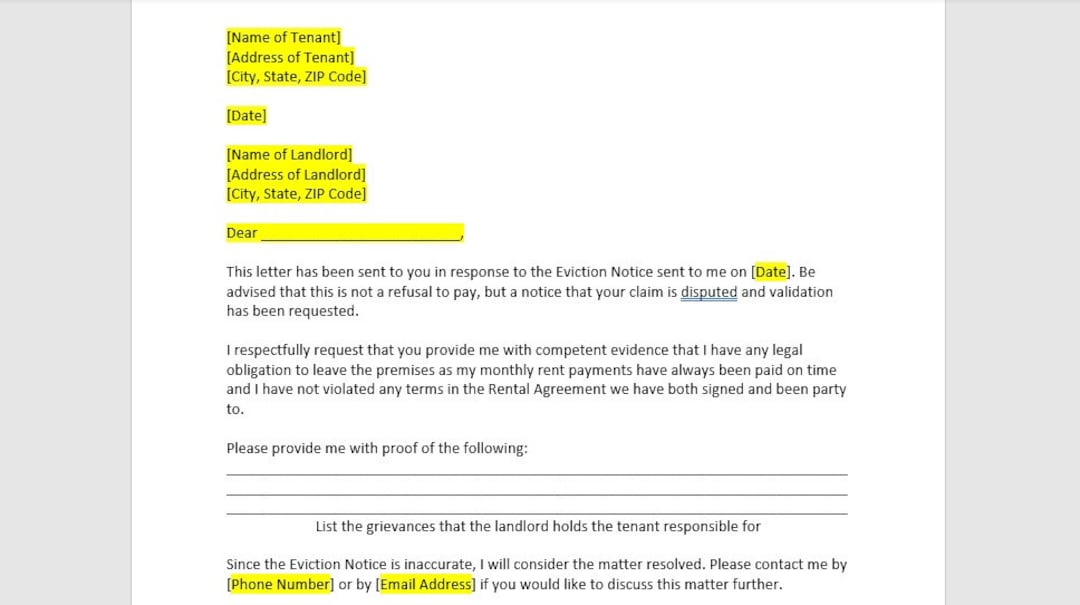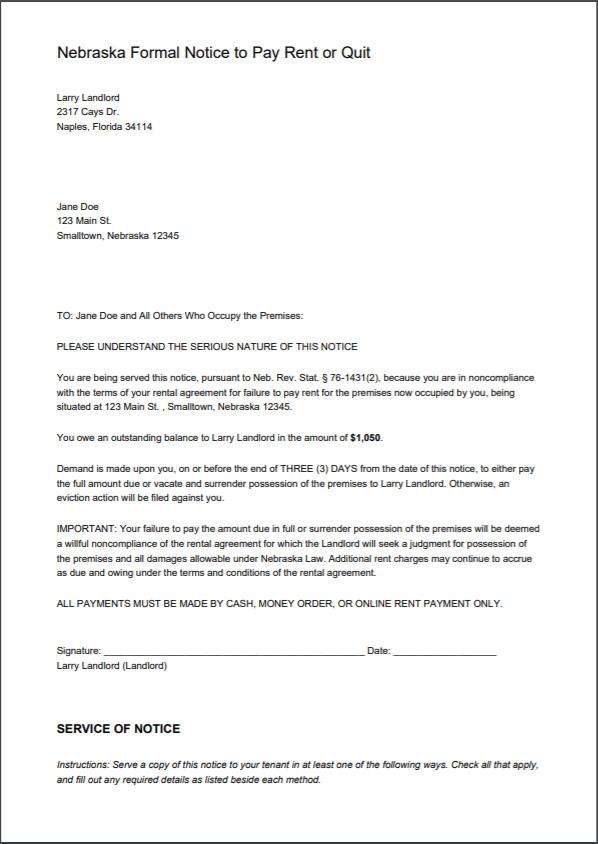Imagine this: you’re enjoying a crisp morning cup of coffee, the sun streaming through your window, only to find a chilling eviction notice tucked under your doormat. Your heart sinks as you realize the implications: a loss of your home, potential damage to your credit, and the emotional turmoil of uncertainty. But don’t despair! While receiving an eviction notice can be a stressful experience, knowing your rights and crafting a well-written response letter can significantly improve your chances of resolving the situation.

Image: www.etsy.com
This guide will equip you with the knowledge and tools you need to confidently navigate the eviction process. We will demystify the process, outline the key components of a powerful response letter, and provide practical tips for building a strong defense. Whether you’re facing eviction due to unpaid rent, lease violations, or other reasons, this comprehensive guide will empower you to take control of your situation and protect your interests.
Understanding Eviction Notices
An eviction notice, also known as a “Notice to Quit” or “Notice to Vacate,” is a formal legal document issued by a landlord informing a tenant that they are required to vacate the property within a specified timeframe. The notice must state the reason for eviction, which can range from non-payment of rent to violations of the lease agreement.
Every state has its own set of rules and regulations governing the eviction process. Familiarizing yourself with your state’s laws is crucial. For example, the required notice period can vary significantly, with some states requiring as little as three days’ notice, while others mandate 30 days or more. Failure to comply with the eviction notice’s terms can lead to further legal action, including court proceedings and potential eviction.
Key Components of a Response Letter
When crafting your response letter to an eviction notice, it’s essential to address all the key points raised by the landlord. The goal is to demonstrate that you understand the situation, acknowledge any wrongdoing, and present your rationale for resolving the issue.
Here are the essential components to include in your response letter:
1. Heading and Basic Information
Start by clearly identifying the parties involved, the property address, and the date. For example:
John Doe
123 Main Street
Anytown, USA 12345
(123) 456-7890
[email protected]
[Date]
[Landlord’s Name]
[Landlord’s Address]
[Landlord’s Phone Number]
[Landlord’s Email Address]
RE: Response to Eviction Notice – [Your Property Address]

Image: www.aiophotoz.com
2. Acknowledging the Notice
Start your letter by acknowledging receipt of the eviction notice. Briefly state the date you received it and the reason for eviction cited in the notice. This demonstrates that you understand the situation and take the matter seriously.
Example:
This letter serves as a response to the eviction notice I received on [date] regarding [reason for eviction cited in the notice].
3. Addressing the Landlord’s Claims
In this section, you need to address each of the landlord’s claims in the eviction notice. If you agree with the landlord’s claims, acknowledge them and clearly explain your plan for addressing the situation. For example, if you’re behind on rent, explain why, and outline your plan to catch up on payments.
If you disagree with the landlord’s claims, you need to present your side of the story. Be respectful but firm in your explanation. Cite evidence to support your statements, such as copies of receipts, emails, or documentation of previous attempts to resolve the issue.
Example:
While I understand that the notice indicates non-payment of rent, I would like to clarify that [explain your circumstances, including any documentation to support your claims, such as proof of a financial hardship].
4. Proposed Resolution
After addressing the landlord’s claims, outline your plan for resolving the issue. Be specific about your intended actions and provide a timeline for completing them. This shows the landlord that you are taking responsibility and are committed to resolving the situation.
Example:
To address the outstanding rent balance, I propose [explain your proposed payment plan, including a timeline for catching up on payments and any additional details].
5. Final Appeal
End your letter with a final appeal to your landlord. Explain how a resolution would benefit both parties. For example, you could emphasize your commitment to being a responsible tenant and explain how a timely rent payment would be in their best financial interest.
Example:
I am determined to remain a responsible tenant in your property and believe that resolving this matter through [your proposed solution] would be beneficial for both of us. I am open to further discussion and am confident that we can find a mutually agreeable solution.
6. Closing and Signature
End your letter professionally. Briefly summarize your request and express your willingness to discuss the matter further.
Example:
Thank you for considering my response. I am available to discuss this matter further at your convenience.
Sincerely,
[Your Name]
[Your Address]
[Your Phone Number]
Additional Tips for Writing an Effective Response Letter
Remember, your response letter is an important part of the eviction process. Here are some additional tips that can increase its effectiveness:
- Be Professional and Respectful: Maintain a professional tone throughout the letter, even if you feel frustrated or angry.
- Stay Organized and Concise: Present your arguments clearly and directly.
- Proofread Carefully: Errors in grammar and spelling can undermine your credibility.
Key Considerations for Specific Situations
The contents of your response letter will depend on the reason for the eviction notice. Here are some considerations for different scenarios:
Non-payment of Rent
- Explain the reasons for late payment: For example, financial hardship, job loss, or medical emergencies.
- Propose a payment plan: Outline your plan to catch up on rent payments.
- Consider negotiating a rent reduction: If you are facing financial hardship, you might negotiate a temporary rent reduction.
Lease Violations
- Acknowledge the violation: Be upfront and admit any wrongdoing.
- Explain your actions to rectify the situation: For example, making repairs or addressing a noise complaint.
- Express your commitment to upholding the lease agreement.
Other Reasons for Eviction
- Address the specific issue: For example, if the eviction notice is due to unauthorized pets or damage to the property, address the issue directly and provide a solution.
- Show evidence to support your case: For example, if you were evicted for excessive noise, provide proof that you addressed the issue.
Seeking Professional Help
While you can often navigate the eviction process yourself, consider consulting a legal professional, especially if:
- You face complex legal issues: For example, if the eviction notice is based on discrimination or false claims.
- You are unsure of your rights: A lawyer can provide guidance and representation.
- You are facing potential eviction without a valid reason: A lawyer can help you challenge the eviction proceeding.
Navigating the Eviction Process
Even after sending your response letter, you may still face challenges. Here are some key steps to remember:
- Follow all legal deadlines: Be aware of the deadlines set forth in the eviction notice. Failure to do so can result in further consequences.
- Attend court hearings: If the landlord files an eviction lawsuit, you will need to appear in court to defend your case.
- Prepare supporting documentation: Gather any relevant evidence to support your claims, such as leases, receipts, and correspondence.
- Be prepared for negotiations: While you may be able to reach a settlement with the landlord outside of court, it’s important to be prepared for potential negotiations.
Beyond the Response Letter: Tenant Rights and Resources
It’s important to understand your rights as a tenant and explore available resources:
- Know your state’s tenant laws: Visit your state’s government website to find information about tenant rights and eviction procedures.
- Contact a tenant advocacy group: Many organizations provide legal aid, counseling, and information for tenants facing eviction.
- Seek mediation: Contact your local housing court or mediation center to see if they offer mediation services to help resolve eviction disputes.
Tenant Sample Response Letter To Eviction Notice
Conclusion
Receiving an eviction notice can be a daunting experience, but knowing your rights and understanding the process can make a significant difference in protecting your interests. By crafting a well-written response letter, addressing the landlord’s claims, outlining your proposed resolution, and seeking professional help when necessary, you can navigate the eviction process with greater confidence. Remember, you are not alone, and with the right information and support, you can achieve a positive outcome.






